Where Are the Borders of Israel, Turkey, and Iran? - By Ghassan Charbel, Asharq Al-Awsat
An Iraqi politician said that difficult years awaited his country – a country that has been longing to become a normal sovereign state and to devote itself to development and the future of its people.
However, he noted that the process of restoring Iraq appears to be thorny and booby-trapped. Neither the United Nations provides a protective umbrella, nor is the United States ready to prioritize the Iraqi file.
The experienced politician saw that regional authorities have unleashed their lusts in interests and roles, benefiting from the decline in the prestige of major powers and international law.
He said that the forces currently defying Mustafa Al-Kadhimi’s government were relying on Iranian support, which “has created parallel institutions to those of the Iraqi state.” He also pointed out that Turkey gives itself the right to interfere in Iraqi soil, disregarding Baghdad’s complaints.
The region lives without a policeman. In the absence of true international power, the repressed desires arose.
Here is Recep Tayyip Erdogan pushing the Turkish offensive into the Libyan territories, forcing Cairo to diverge from its traditional dissociation approach and to note that it has an army capable of defending its stability and interests.
Whoever reads the reports published by some Turkish media about Libya’s “tremendous mineral wealth”, in addition to its oil and gas, recalls previous experiences in international relations that allowed such practices.
Erdogan went too far in his policy of misunderstanding towards the world. He obviously chose military intervention to secure a role for his country, not only in the future of Libyan contracts, but also in exploration in the eastern Mediterranean.
International management is absent in the Middle East. The United States is no longer ready to be an international policeman. Some even believe that Washington is unable to assume such a mission, even if it wanted to.
It is a costly and risky task. It is financially expensive and sometimes leads to bloody military interventions.
The current US Administration does not find itself forced to send its army to uproot a leader, who is considered a tyrant by his people. Sowing democracy through military intervention is no longer on the agenda.
America is also no longer interested in portraying the image of a superpower that disciplines outlaws or those who threaten the stability of their neighbors. Moreover, great powers were never charitable societies driven by these noble motives that are repeated in official statements.
It is not only a matter of disappointment left by the US military intervention in Iraq; but also about the US preoccupation with other regions. It is clear that America has been concerned for years with China’s rise, more than it is worried about the trembling Middle East and the rifts in some of its maps.
This does not mean that Washington has retreated from the region and no longer has interests in it. The Middle East is always present in its calculations, but perhaps within different methods and approaches.
The best evidence for what we say is the sanctions that the United States re-imposed to Iran during Donald Trump’s era after it withdrew from the nuclear agreement with Tehran.
Some experts believe that this policy of maximum pressure has caused great damage to Iran’s economy and its ability to support its allies in the region.
This pressure is accompanied by attempts to disrupt the Iranian nuclear program, through “mysterious strikes” on Iranian soil, at a time when the Israeli war on Iran’s “military presence” in Syria continues.
Although the US is concerned about Iranian nuclear enrichment and destabilizing policies, we cannot talk about an imperative US role – that of a policeman who rewards and reprimands.
In parallel, Russia cannot aspire to play a role of such kind and size. Russia’s economic capabilities do not allow it to assume a mission with such costs.
There is no doubt that Moscow is watchful of any US mistake or failure. It is also interested in selling weapons and attracting allies or friends, but, on the other hand, it is unable to develop solutions to thorny files.
A good example is that Russia, which managed to save the Syrian regime, does not have the ability to launch the file of reconstruction in Syria.
Europe, for its part, is becoming weaker and more reserved, while China is adopting a conservative approach when it comes to imposing its role in the international scene.
The Iraqi politician believes that the problem in the Middle East lies in the absence of an international deterring force. This increases the appetites of the three countries that refuse to operate within their maps under various pretexts, taking advantage of the weakness of international legitimacy and the absence of the American policeman.
Israel prepares to annex more lands. Turkey, which has forces in Syria and Iraq and military bases in Qatar and Somalia, is now intervening militarily in Libya and threatening Europe with waves of refugees and the infiltration of terrorists. Iran has almost made the violation of maps a common practice.
The Iraqi politician said that the region “will not be stable before its people can know the answer to an evident question: Where are the borders of Israel, Turkey, and Iran?”
Latest News
-
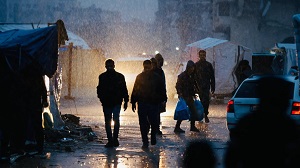 US, Qatar, Turkey, Egypt meet in Miami to discuss Gaza truce on Friday
US, Qatar, Turkey, Egypt meet in Miami to discuss Gaza truce on Friday
-
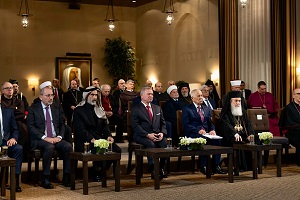 King receives Christian, Muslim religious leaders from Jerusalem, Jordan ahead of Christmas
King receives Christian, Muslim religious leaders from Jerusalem, Jordan ahead of Christmas
-
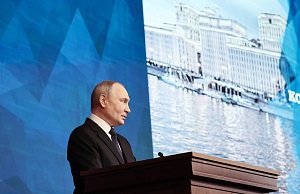 Putin says Russia will 'certainly' achieve its goals in Ukraine
Putin says Russia will 'certainly' achieve its goals in Ukraine
-
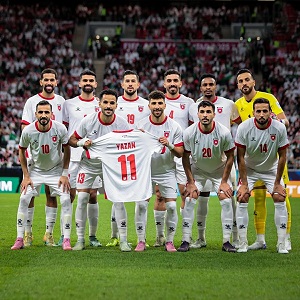 Sellami: Jordan target Arab Cup glory against ‘strong’ Moroccan side
Sellami: Jordan target Arab Cup glory against ‘strong’ Moroccan side
-
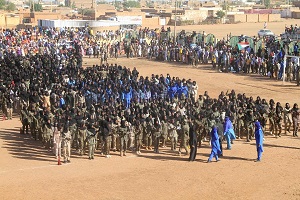 RSF destroying evidence of atrocities in Sudan - report
RSF destroying evidence of atrocities in Sudan - report